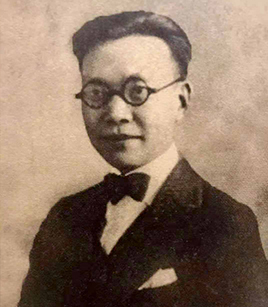Jin Yuelin

FILE PHOTO: Jin Yuelin in his youth
Jin Yuelin (1895–1984) was a leading Chinese philosopher and logician. After studying at the University of Pennsylvania and Columbia University in the United States, he returned to China and established the Department of Philosophy at Tsinghua University in 1926, where he started teaching modern logic for the first time in China. Jin’s personality and thoughts have had a lasting impact on China’s logicians and philosophers right up to today.
Like many other Chinese intellectuals of his time, Jin was greatly influenced by Western ideas. He set up a new philosophical system combining elements from Western and Chinese philosophical traditions, especially the concept of Tao. According to scholar Yvonne Schulz Zinda, Jin presented philosophy as a practical approach to solving problems, which was quite different from how Chinese philosophers at the time viewed the study of philosophy. In his essay “Chinese Philosophy,” Jin regarded the Western approach to philosophy as being more of a meticulous scientific and logical approach that he traced back to the Hellenistic thought of Ancient Greece. In contrast, he described Chinese philosophy as featuring “the underdevelopment of what might be called logico-epistemological consciousness” (See “Chinese Philosophy”).
During the time of the War of Resistance Against Japanese Aggression, Jin accomplished his masterpiece, Theory of Knowledge, in Kunming, Yunnan Province. Unfortunately, his manuscript of this book was lost in an air raid. Jin said, “In an air raid [in 1940], I carried the manuscript [of the Theory of Knowledge] and ran to the Snake Hill in northern Kunming. When hiding in the hill, I sat on the manuscript. As soon as the air-raid warnings were over, I immediately stood up and left. By the time I remembered the manuscript that I left behind and went back to look for it, it had gone missing. Rewriting a book of hundreds of thousands of words was not easy, but I must do it.” Over the next eight years, Jin rewrote and published the Theory of Knowledge, a book of approximately 700,000 characters.
Edited by REN GUANHONG

 PRINT
PRINT CLOSE
CLOSE